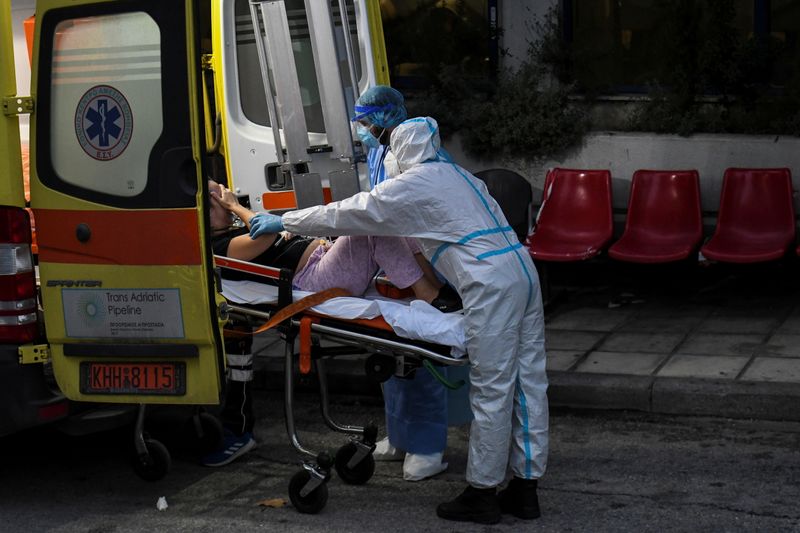By Roshan Abraham and Rittik Biswas
(Reuters) -Global COVID-19 cases surpassed 250 million on Monday as some countries in eastern Europe experience record outbreaks, even as the Delta variant surge eases and many countries resume trade and tourism.
The daily average number of cases has fallen by 36% over the past three months, according to a Reuters analysis, but the virus is still infecting 50 million people worldwide every 90 days due to the highly transmissible Delta variant.
By contrast, it took nearly a year to record the first 50 million COVID-19 cases.
Health experts are optimistic that many nations have put the worst of the pandemic behind them thanks to vaccines and natural exposure, although they caution that colder weather and upcoming holiday gatherings could increase cases.
"We think between now and the end of 2022, this is the point where we get control over this virus ... where we can significantly reduce severe disease and death," Maria Van Kerkhove, an epidemiologist leading the World Health Organisation, told Reuters on Nov. 3.
Infections are still rising in 55 out of 240 countries, with Russia, Ukraine and Greece https://tmsnrt.rs/34pvUyi at or near record levels of reported cases since the pandemic started two years ago, according to a Reuters analysis.
Eastern Europe has among the lowest vaccination rates https://tmsnrt.rs/34pvUyi in the region. More than half of all new infections reported worldwide were from countries in Europe, with a million new infections about every four days, according to the analysis.
Several Russian regions said this week they could impose additional restrictions or extend a workplace shutdown as the country witnesses record deaths due to the disease.
On Monday Russia reported 39,400 new COVID-19 cases, including nearly 5,000 in Moscow alone.
VACCINE INEQUITY
In Germany, too, despite much higher levels of vaccination, the infection rate rose to its highest level since the start of the pandemic and doctors said they would need to postpone scheduled operations in coming weeks to cope.
By contrast, Japan recorded no daily deaths from COVID-19 on Sunday for the first time in more than a year, local media said. Vaccinations have increased now to cover more than 70% of Japan's population.
China, the world's most populous country where the pandemic first began, administered about 8.6 million doses of COVID-19 vaccines on Sunday, bringing the total number of doses given to 2.3 billion, data showed on Monday.
Several world leaders have stressed the need to improve vaccination programs, particularly in the poorest countries.
More than half the world's population has yet to receive a single dose of a COVID-19 vaccine, according to Our World in Data, a figure that drops to less than 5% in low-income countries.
Improving vaccine access will be on the agenda of meetings of the powerful Asia-Pacific trade group APEC, hosted virtually by New Zealand this week.
APEC members, which include Russia, China and the United States, pledged at a special meeting in June to expand sharing and manufacturing of COVID-19 vaccines and lift trade barriers for medicines.

"Together we are continuing to keep supply chains functioning and are supporting trade in critical medical supplies – including testing kits, PPE and now vaccines," New Zealand Prime Minister Jacinda Ardern said on Monday.
The World Health Organization and other aid groups last month appealed to leaders of the world's 20 biggest economies to fund a $23.4 billion plan to bring COVID-19 vaccines, tests, and drugs to poorer countries in the next 12 months.